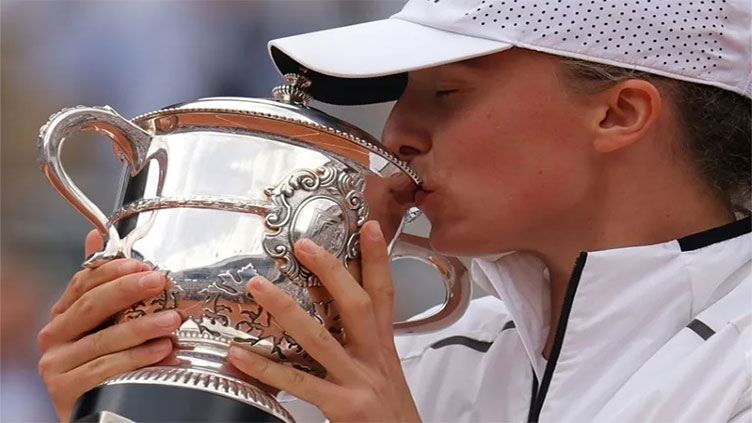Wimbledon women's singles: Three talking points

Sports
Iga Swiatek will attempt to add the Wimbledon title to the US and French Open crowns.
LONDON (AFP) – Iga Swiatek will attempt to add the Wimbledon title to the US and French Open crowns she already possesses when the third major of the season gets under way on Monday.
There will also be focus on the continuing bitter fall-out from the decision to allow Russian players to return after a 2022 ban while all women players are at least united on one point -- a welcome change to the tournament's strict all-white playing gear rule.
AFP Sport looks at three talking points at Wimbledon 2023.
SWIATEK DESPERATE TO CRACK CODE
With three French Open titles and a US Open already secured, world number one Iga Swiatek now tries to crack the Wimbledon code which has left her baffled in three visits so far.
A first round exit in 2019 and third round loss last year sandwiched the Pole's best run so far to the last 16 in 2021 where she was defeated by Ons Jabeur.
Her third round loss to Alize Cornet in 2022 ended a 37-match winning run.
"I tried many things to feel better on a grass court, but it didn't really work out," said Swiatek after her loss to the veteran Cornet.
On Monday, Swiatek played her first grass-court match of the season and had to battle from a set down to defeat 2022 Wimbledon semi-finalist Tatjana Maria in Bad Homburg.
Should the 22-year-old Pole falter at the All England Club then Belarusian world number two Aryna Sabalenka, banned last year, will look to pounce having made the semi-finals in 2021.
Petra Kvitova, the champion in 2011 and 2014, is also hovering having won a sixth career grass-court title in Berlin at the weekend.
Swiatek's other main threat should be defending champion Elena Rybakina but the Moscow-born Kazakh has yet to fully recover from a virus which caused an early withdrawal from the French Open.
NO HAND OF FRIENDSHIP ON RUSSIAN RETURN
After being banned last year, Russian and Belarusian players return to Wimbledon but that will only deepen the resolve of Ukraine's stars to give their rivals the cold shoulder.
At the French Open, the refusal of Ukraine players to shake hands with Russian and Belarusian opponents in protest at the ongoing war sparked bitter wrangling.
Ukraine's Marta Kostyuk told French fans they should be "embarrassed" for booing her after she refused to shake hands with Aryna Sabalanka.
Elina Svitolina also refused to offer the traditional post-match gesture after losing to Sabalenka in the quarter-finals.
"I won't sell my country out for likes," said Svitolina who has been awarded a wild-card to play at Wimbledon this year.
Sabalenka boycotted back-to-back news conferences in Paris claiming the tough questions she faced over her close links to Belarus President Alexander Lukashenko caused her not to feel "safe".
To play at Wimbledon this year, all Russian and Belarusians must sign a declaration of neutrality, have no links to state funding and must not demonstrate any support for the war.
RIGHT MOVE ON WHITE CLOTHING
Wimbledon will relax its famously tough policy on competitors wearing all-white playing gear. Women players can now wear dark-coloured underwear to reduce anxieties while on their periods.
"Following consultation with players, women and girls competing at The Championships will have the option of wearing coloured undershorts if they choose," said chief executive Sally Bolton.
"It's our hope that this rule adjustment will help players focus purely on their performance by relieving a potential source of anxiety."
Coloured underwear has been spotted at Wimbledon in the past.
In 2007, France's Tatiana Golovin sported red shorts underneath her white dress, a decision which prompted a memorable first question at her post-match news conference.
"Can I ask you about your knickers?"

